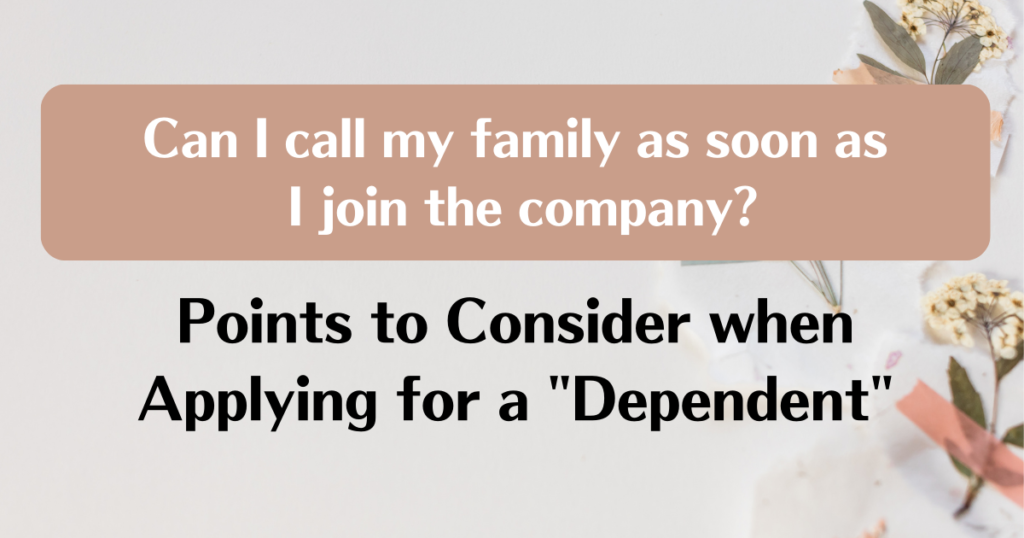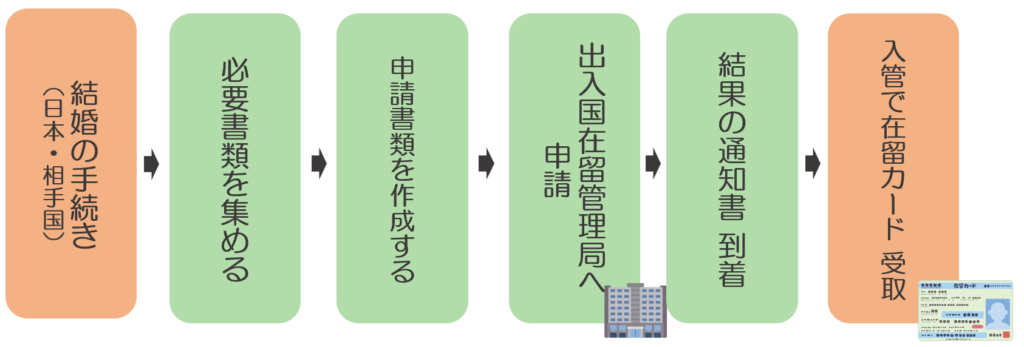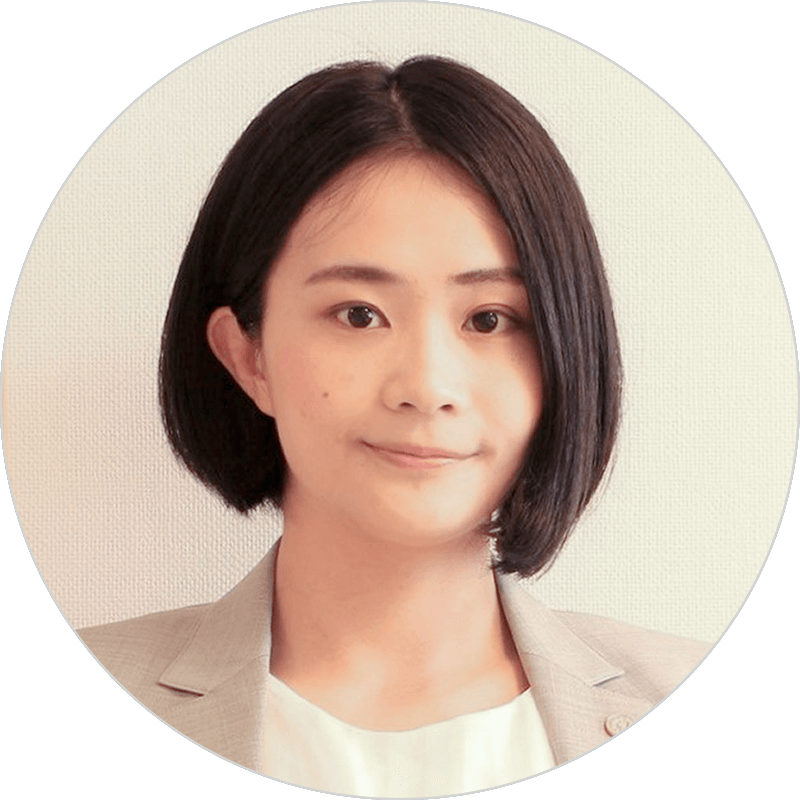
Foreign nationals residing in Japan on a work visa can have their family members live in Japan with them by obtaining the status of residence “Dependent(家族滞在)” visa.By obtaining this “Dependent” status of residence (visa), you can invite your spouse (wife/husband) or children to Japan. Our office is often asked the question, “Can I get permission even if I have just started working or changed jobs? In this part, we will answer your question while taking into consideration the key points of the “Dependent” status.
How a working foreigner can live with his/her family in Japan

Foreign nationals residing in Japan on a work visa can invite their family members to live with them. They can stay in Japan with their family members by obtaining a “Dependent” Visa. The family members that can be invited to Japan are wives, husbands, and children.
Scope of family members who can live with you in Japan
Family members who can live together in Japan are wives, husbands, and children. Family members will live in Japan under the support of the person working on a work visa.
Invie: Status of residence (visa) for supporters(foreign nationals with a work visa)
If the person calling the family (foreign national with a work visa) has one of the following statuses of residence (visa), he/she can call his/her family members under the “Dependent” status. But not all work visas allow family members to accompany the applicant. For example, in the case of “Technical Intern Training(技能実習)” or “Specified Technical Skilled Worker 1(特定技能1号)”, it is not permitted in principle to invite family members to Japan.
First, please make sure that the supporter (foreign nationals with a work visa) have a work visa that allows them to invite their family members for a “Dependent”.
“Professor”, “Artist”, “Religious activities”, “Journalist”, “Highly skilled Professional”, “Business Manager”, “Legal/Accounting Services”, “Medical Services”, “Researcher”, “Instructor”, “Engineer”, “Intra-company Transferee”, “Nursing Care”, “Entertainer”, “Skilled Labor”, “Specified Skilled Worker II”, “Cultural Activities”, and “College Student” (limited to those that fall under the criteria Ministerial Ordinance No. 1 (a) or r (b))
「教授」、「芸術」、「宗教」、「報道」、「高度専門職」、「経営・管理」、「法律・会計業務」、「医療」、「研究」、「教育」、「技術・人文知識・国際業務」、「企業内転勤」、「介護」、「興行」、「技能」、「特定技能2号」、「文化活動」、「留学」(基準省令第1号イ又はロに該当するものに限る
Those who are residing in Japan under the ” Designated Activities(特定活動)” status, which allows for some employment, may also invite their family members, but in such cases, they must do so under a status of residence other than “Dependent” (the concept is the same as that of “Dependent”).
Invited: Scope of family members who can get “Dependent” visa.
The “spouse (wife/husband)” and “children” can be invited to Japan.
The spouse must be married. Divorced or deceased spouses are not included. Also, a common-law spouse is not recognized. “Children” can be adopted (regular or special adoption). Children born before marriage and children born shortly after marriage (illegitimate children) are also recognized as “children” if they are acknowledged. They are also recognized even if they have reached the age of majority.
On the other hand, parents and grandparents cannot be invited to Japan for “Dependent”. There are cases in which inviting parents to Japan to live together is permitted under other statuses of residence, but this does not apply to “Dependent” status.
Points of screening for “Dependent” visa
When applying for “Dependent” status, there are three points that must be confirmed. First, make sure that these points are met.
Point 1: Marriage must be established (in the case of a wife/husband)
When applying for “Dependent,” a marriage must have been consummated. A common-law marriage or engaged status is not acceptable. The marriage must be legally valid and subsisting.
Marriage procedures need only be validly consummated in either the foreign country or Japan. For example, if you are inviting family members from your home country, you do not need to register your marriage at the Japanese municipal office as long as the marriage certificate has been consummated in the home country,
Conversely, if the couple got married while in Japan, there is no problem even if the marriage certificate has not been submitted to the administrative office in the home country, as long as the marriage certificate has been submitted to and accepted by the Japanese municipal office.
Point 2: Ability to support/receive support
The “Dependent” status of residence requires the applicant to be a dependent of a worker with a work visa. In other words, you must “have the ability to support your family” and your family must be willing to receive support and stay in Japan in that condition”.
First of all, the person who is calling his/her family must have a regular job. In the first place, those who are in Japan on a working visa are (in most cases) working full-time and receiving a salary that is sufficient to support at least one adult. If they are unemployed, they do not have the necessary conditions to stay in Japan on a “work visa,” and therefore cannot invite family members to stay.
We are often asked, “How much salary do I need to have in order to be allowed?” but there is no clear standard. This is because it depends on the number of family members, assets, and other factors. As long as your current salary is sufficient to live with your family in Japan, there is no problem.
Some “rumors” that come to our office say that a monthly salary of 250,000 yen is necessary, but this information is generally false. Depending on the family structure, a monthly salary of 200,000 yen may be acceptable, while a monthly salary of 300,000 yen may be inadmissible.
Next, regarding “receiving support,” the called person can work part-time by obtaining a “permission to engage in activities other than that permitted under the status of residence(資格外活動許可)” in addition to the “Dependent” permit, but only within the scope of “support”.
If a person residing in Japan on a “Dependent” visa obtains the “permission to engage in activities other than those permitted under the status of residence,” he/she can work part-time up to 28 hours per week. If the salary from this part-time work exceeds the salary of the supporter working on a work visa, the “dependent” has exceeded the “coverage” and will be assessed as “not receiving support”.
Point 3: Must live together.
Especially in the case of married couples, they must live together in principle. The Japanese Immigration Service Agency focuses on “living together” as one of the criteria for determining “marital status”. If the couple does not live together, the application will not be denied in all cases, but it is necessary to explain the circumstances.
Possible examples include the case where one of the parents moves out on his/her own for reasons such as not being able to move his/her child to a new school, or where a child starts living alone to go to college. In particular, it is important to note that a clear explanation is required for the separation of a husband and wife.
Case-by-Case Explanation: Is “Dependent” Permitted Immediately after Employment?

If the points explained in the previous chapter are met, it is possible to apply for “Dependent” even after employment, job change, or before coming to Japan after finding a job in Japan.
*All answers below are based on the assumption of “one” family member to be called.
Case 1: Is it possible to invite family members immediately after changing jobs?
Can I apply for a Dependent immediately after changing jobs? How long do I need to wait?” This is one of the most frequently asked questions. In many cases, it is possible to bring in family members immediately after changing jobs. Basically, it is enough if you can provide documents such as a “Written Employment Conditions(雇用条件書) ” or “Notice of Employment(労働条件通知書)” that can confirm the conditions of employment and the nature of the work.
Case 2: I am in the process of changing my visa status from a college student visa to a work visa. Can I apply for it at the same time?
Can I apply for a Dependent visa immediately after I start working? The answer is the same as case 1), but in many cases it is possible to call them immediately after employment. Or, it is possible to apply for it during the application of a change of status of residence from college student to working visa at the same time. In this case, the minimum requirement is that the work visa of the person calling his/her dependents (foreign nationals with work visas) is approved. Only a Dependent visa will not be granted.
Case 3: I am currently living abroad. Is it possible for me and my family to enter Japan at the same time?
I am currently living abroad. I would like to immigrate with my whole family when I get a job in Japan. Is it possible to enter Japan at the same time?” Yes, it is possible. For example, it is possible to apply for a work visa for a supporter (a person working on a work visa) and apply for a “Dependent” visa for that family member at the same time, or to apply for a Dependent visa later after the work visa is approved, and enter Japan at the same time after all family member’s visas are approved. In either case, however, the cooperation of the employing company may be required.
When applying for a work visa and “Dependent” visa at the same time, as explained in Case 2, the minimum requirement is that the work visa of the supporter (foreign national with a work visa) be approved. Only family stay will not be granted.
Application Procedures for ” Dependent ” visa

To apply for “Dependent” visa, make sure that you meet the requirements, prepare the necessary documents, and then apply at the “Immigration Service Agency(出入国在留管理局)” that has jurisdiction over the area where you live.
Procedures for inviting family members from abroad – Application for Certificate of Eligibility(在留資格認定証明書交付申請)
The procedure for inviting a family member (wife, husband, or child) from abroad to Japan is called “Application for Certificate of Eligibility”. This procedure is performed at the Immigration Service Agency by the person calling the family member (foreign national with a work visa) on behalf of the family member. If both spouses are abroad, the company where they plan to work, which acted as their agent when they applied for their work visas, can act as their agent to complete the procedures.

Procedures for changing status of residence from other status of residence to “Dependent” -Application for change of status of residence(在留資格変更許可申請)
If you wish to change the status of residence of a family member (wife, husband, or child) already living in Japan to “Dependent”, you must apply for “Application for Change Status of Residence”. This procedure is performed at the “Immigration Service Agency” that has jurisdiction over the area where the dependent family member (wife, husband, or child) lives.

Required documents
| In the case of a spouse (wife/husband) |
|---|
| ・Application for Certificate of Eligibility / Application for Change of Status of Residence(在留資格認定証明書交付申請書/在留資格変更許可申請書) ・ID photo ・Marriage certificate ・Document certifying the occupation and income of the supporter (e.g. certificate of employment, certificate of taxation/tax payment of resident tax(在職証明書、住民税の課税・納税証明書)) ・Residence card/passport (*Presentation, in case of application for change of status of residence) |
| In the case of a child |
|---|
| Application for Certificate of Eligibility / Application for Change of Status of Residence(在留資格認定証明書交付申請書/在留資格変更許可申請書) ID photo Birth certificate/Certificate of recognition Document certifying the occupation and income of the supporter (e.g. certificate of employment, certificate of taxation/tax payment of resident tax(在職証明書、住民税の課税・納税証明書)) Residence card/passport (*Presentation. In case of application for change of status of residence) |
*In addition to the above, documents that provide supplementary explanation about your life and documents that show your past status of residence may also be required. The above is the minimum required documentation.
Application to the Immigration Service Agency
Basically, application is made at the Immigration Service Agency that has jurisdiction over the residence of the applicant or the applicant’s representative.
The following are the rules regarding where to apply.
【Application for Certificate of Eligibility】 ※In case the foreigner is abroad. The regional immigration office with jurisdiction over the planned place of residence or the place of residence of the applicant’s representative.
【Application for change of status of residence or application for permission for extension of period of stay】
Regional immigration office with jurisdiction over the place of residence
| Regional Immigration Office | Area of jurisdiction of the |
|---|---|
| Sapporo Immigration and Residence Office | Hokkaido |
| Sendai Immigration Bureau | Miyagi, Fukushima, Yamagata, Iwate, Akita, Aomori |
| Tokyo Immigration Bureau | Tokyo, Kanagawa Prefecture (Yokohama Branch Office has jurisdiction), Saitama Prefecture, Chiba Prefecture, Ibaraki Prefecture, Tochigi Prefecture, Gunma, Yamanashi, Nagano, Niigata |
| Nagoya Immigration Bureau | Aichi, Mie, Shizuoka, Gifu, Fukui, Toyama, Ishikawa |
| Osaka Immigration Bureau | Osaka, Kyoto, Hyogo (Kobe Branch Office has jurisdiction), Nara, Shiga and Wakayama Prefectures |
| Hiroshima Immigration Bureau | Hiroshima, Yamaguchi, Okayama, Tottori, Shimane |
| Fukuoka Immigration Bureau | Fukuoka, Saga, Nagasaki, Oita, Kumamoto, Kagoshima, Miyazaki Prefectures, Okinawa Prefecture (Naha Branch Office has jurisdiction) |
If there is no branch office nearby, you may apply at the nearest branch or local office.However, depending on the branch office, there may be cases where they do not accept applications for status of residence, so please check with them.
▶ Immigration Services Agency: Jurisdiction
Who makes the application?
When inviting a foreigner from abroad, basically, the applicant’s relative residing in Japan can apply on his/her behalf. In the case of “Dependent visa”, if both husband and wife are abroad, the host institution (place of employment) of the main person (supporter) may act as an agent for the application. The applicant goes to the immigration office that has jurisdiction over the applicant’s planned place of residence or the place of residence of the applicant’s relative or other application agent. If the applicant is a child under 16 years of age, a legal representative (such as a parent) may apply on his/her behalf.In either case, simultaneous entry to Japan is possible if the conditions are met.
Also, a “Intermediary(取次者)” who has filed the application can apply on behalf of the applicant. Examples of “Intermediary” are administrative scriveners(行政書士) and lawyers(弁護士). You can also ask an administrative scrivener to do this for you.
Conclusion

This is an explanation of the “Dependent” visa status.
“Dependent” visa is a status of residence that can be obtained by a spouse (wife/husband) or child of a foreign national working on a work visa. It is also possible to work part-time by obtaining “Permission to Engage in Activities other than that Permitted under the Status of Residence”. “Dependent” visa can be applied for immediately after employment. If the conditions of employment have been decided and a contract has been signed, and other conditions are also met, it is possible to apply for it at the same time as applying for a work visa for a supporter (foreign national working on a work visa).

【Advice from administrative scriveners】
Many people want to start living with their family in Japan as soon as possible. Our office can assist you in the application process smoothly and surely. We can handle both Japanese and international cases, so please feel free to contact us.


